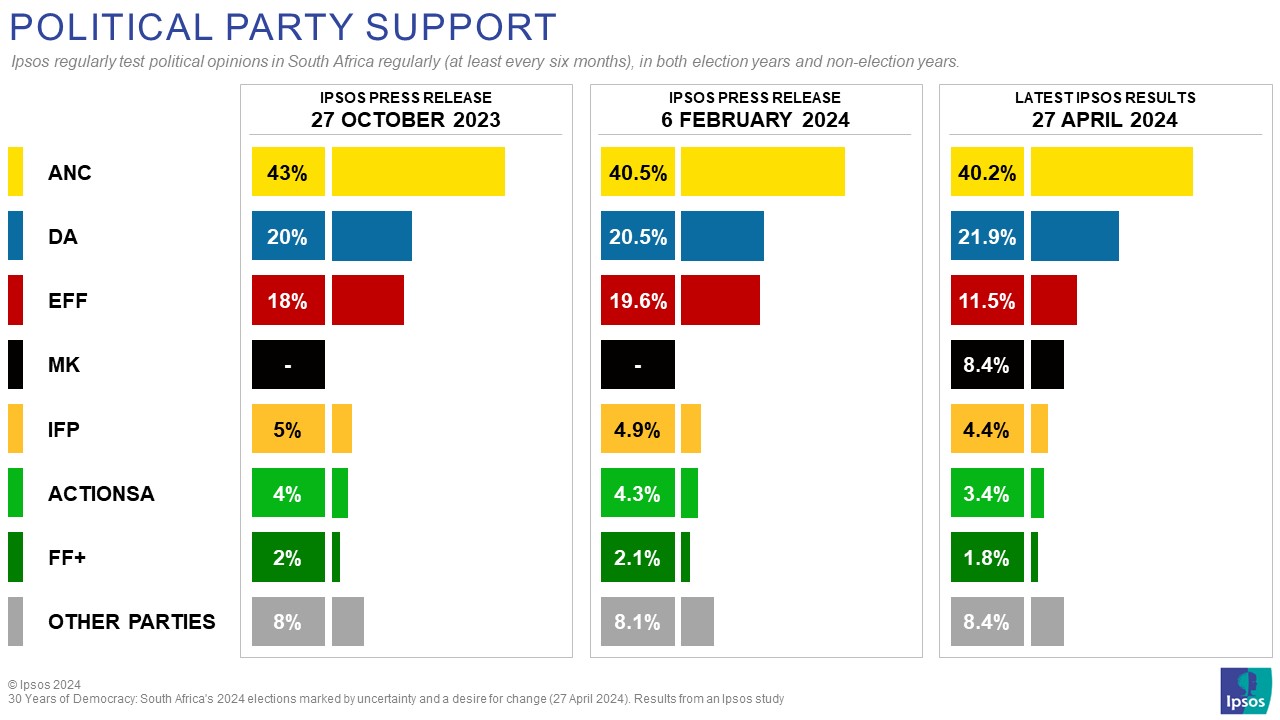30 Years of Democracy: South Africa's 2024 elections marked by uncertainty and a desire for change
As registered voters head to the polls on 29 May 2024, they will be handed three ballot papers by IEC (Independent Electoral Commission) officials. While much of the voting process will feel and look familiar, there are several notable changes from previous national and provincial elections. In addition to the introduction of three separate ballot papers, this election will also feature the historic participation of independent candidates for the first time.
Now, three decades after the historic 1994 elections, South Africans are once again facing a pivotal moment. The uncertainty and apprehension surrounding the potential outcome and consequences of the 2024 elections echo the feelings experienced by the nation on 27 April 1994. Notably, more than a third (35%) of registered voters express that there is "no political party that truly represents their views," underscoring the complex political landscape and the desire for change.
The discontent among South African voters is further evidenced with a mere 23% of registered voters believing that the country is moving in the right direction, while two-thirds (66%) think that the country’s current "direction of travel" is wrong. This underscores the need for political parties and candidates to address the concerns of the electorate.
Political party support1
The latest Ipsos poll, conducted through face-to-face interviews in March and April 2024, surveyed a randomly selected national sample across all nine provinces, settlement types, and rural areas in South Africa. Those who indicated that they were registered to vote (a total of 2,545) were separately analysed. The results for registered voters were weighted and projected using the IEC registration figures, which indicated that the voters’ roll contains 27,698,201 names.
The official formation of the uMkhonto we Sizwe (MK) party in December 2023 had a profound effect on the distribution of support among the leading political parties over the last few months – as illustrated in the graph overleaf.

With only a month remaining before the elections, the political landscape in South Africa is undergoing significant shifts. The ANC, long the dominant force in the country's politics, is struggling to impress voters, with support for the ruling party well below 50%. Nationally, only 38% believe that the ANC will live up to their election promises, and the party's support base has long been concentrated in rural areas.
The emergence of MK has halted the advances made by the EFF in recent years, particularly in KwaZulu-Natal, with some former EFF supporters migrating to the new party. Meanwhile, the DA is maintaining its position, attracting the support of about a fifth of the electorate.
As the campaign enters its final weeks, uncertainty is highest in KwaZulu-Natal, where almost a fifth of the electorate has not yet decided which party or candidate they will vote for. The IFP's support is mainly concentrated in KZN, while Action SA's support comes primarily from Gauteng. Although the FF+ has low overall support, it comes from across the country.
Gauteng and KwaZulu-Natal, with 23.6% and 20.7% of the electorate respectively, will once again be the key provinces to watch in this election. With women comprising 55.24% of registered voters, political parties would be wise to focus on the views and opinions of women during the final month of campaigning.
As South Africa prepares to head to the polls, the shifting political alliances, regional uncertainties, and the importance of the female electorate will all play crucial roles in determining the outcome of this historic election. The party support figures discussed here should not be seen as a firm prediction of possible election results, as the next month will no doubt bring much volatility and change to the political environment. Moreover, not all registered voters will turn out to vote on election day and this will also influence final election outcomes.
1 Ipsos regularly test political opinions in South Africa (at least every six months), in both election years and non-election years.
About the study
- This press release is based on the views of 2,545 registered voters. Interviews were conducted by trained Ipsos interviewers in the homes and home languages of respondents.
- Interviews were conducted from 9 March 2024 to 15 April 2024.
- A scientific process of multi-stage stratified random selection distributed interviews in all areas of the county, including deep rural areas. This methodology ensured that the results are representative of the views of the universe (South Africans eligible to vote) and that findings can be weighted and projected to the universe.
- Those registered to vote were filtered from the total sample and separately weighted – using the voter registration figures from the IEC (Independent Electoral Commission).
- Trained quantitative fieldworkers were responsible for the interviewing and CAPI (Computer-Assisted Personal Interviewing) was used.
- All results were collated and analysed in an aggregate format to protect the identity and confidentiality of respondents.
- Using a ballot paper like that used in an election, respondents had to “vote for” their choice of political party. The question specified that they needed to consider their choice as if the election were happening the next day.
- All sample surveys are subject to a margin of error, determined by sample size, sampling methodology and response rate. The sample error for this sample at a 95% confidence level is a maximum of plus or minus 1.9%.



